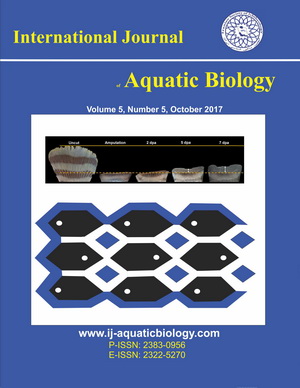Seasonal variation of zooplankton abundance, composition and biomass in the Chabahar Bay, Oman Sea
Downloads
Temporal and spatial variation of zooplankton abundance, composition and biomass were examined on the Chabahar Bay, Oman Sea. The Chabahar Bay, a subtropical and semi-enclosed bay, provides an ideal breeding ground for many fish and shellfish. Five stations were investigated along the Bay. This area is under the influence of the Indian Ocean seasonal monsoons. Zooplankton was collected with vertical plankton tows using 100 µm mesh nets. Copepods dominated the zooplankton community followed by larvacea, cladocera and chaetognatha. Fifteen taxa of zooplankton were identified. Oithona nana and Euterpina acutifrons were dominated in the whole year and Larvacea showed a bloom in Northeast Monsoon. A Two-way ANOVA indicated that there were differences in abundance and biomass between sampling periods and between stations were significant. The peak zooplankton abundance in NE Monsoon could be due to winter cooling, with entrainment of nutrients into the upper layer producing phytoplankton blooms. The decline of zooplankton abundance and biomass in South West Monsoon and post-monsoon could be explained by decrease in chlorophyll a concentrations. The present result showed the composition and distribution of zooplankton differed between the monsoon seasons, resulted from changes in hydrographic conditions.








